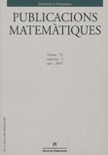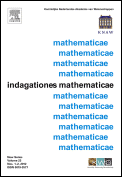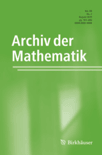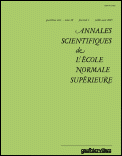
CANADIAN JOURNAL OF MATHEMATICS-JOURNAL CANADIEN DE MATHEMATIQUES
Scope & Guideline
Advancing mathematical excellence, one article at a time.
Introduction
Aims and Scopes
- Algebra and Number Theory:
The journal covers various topics in algebra, including group theory, ring theory, module theory, and number theory, with applications to arithmetic geometry and algebraic structures. - Geometry and Topology:
Research in this area includes differential geometry, algebraic geometry, and topology, exploring properties and structures of geometric objects and their transformations. - Analysis and Functional Analysis:
The journal publishes work on real and complex analysis, functional analysis, and operator theory, investigating the behavior and properties of functions, spaces, and operators. - Combinatorics and Discrete Mathematics:
This includes studies on graph theory, combinatorial designs, and other discrete structures, focusing on counting, arrangement, and optimization problems. - Mathematical Physics and Applications:
The journal addresses mathematical models and techniques used in physics, including quantum mechanics, statistical mechanics, and dynamical systems. - Computational Mathematics:
Works that involve numerical methods, algorithms, and computational techniques for solving mathematical problems are also featured, highlighting the intersection of mathematics and computer science.
Trending and Emerging
- Noncommutative Geometry:
This area is gaining traction as researchers explore the implications of noncommutative spaces and operator algebras, leading to novel insights in both mathematics and theoretical physics. - Homological Algebra and Representation Theory:
There is a growing focus on homological techniques and their applications in representation theory, particularly concerning categories and derived structures. - Mathematical Aspects of Machine Learning:
The intersection of mathematics and machine learning is emerging as a significant theme, with an increasing number of papers addressing algorithms, statistical learning theory, and optimization problems. - Topological Data Analysis:
As data science grows, so does the application of topology to data analysis, with more researchers investigating topological features of data sets. - Algebraic Combinatorics:
The blend of algebra and combinatorial techniques is becoming increasingly popular, with researchers exploring new combinatorial structures and their algebraic properties.
Declining or Waning
- Elementary Number Theory:
Papers dealing with basic concepts of number theory and elementary results have become less frequent, indicating a shift towards more advanced and abstract topics. - Classical Geometry:
There has been a decline in publications focused on classical Euclidean geometry, as the journal increasingly emphasizes modern geometrical theories and applications. - Probability Theory:
Research articles specifically centered around foundational aspects of probability theory appear to be decreasing, suggesting a move towards applied probability and statistical methods. - Mathematical Education:
Topics related to the pedagogy of mathematics and educational strategies have become less represented, reflecting a shift towards more research-oriented mathematical inquiries. - Graph Theory Basics:
While combinatorial studies continue to thrive, there seems to be a waning interest in foundational graph theory topics, with a preference for more complex and specialized areas.
Similar Journals

Periodica Mathematica Hungarica
Exploring Innovative Theories and Methodologies.Periodica Mathematica Hungarica is a prestigious academic journal published by Springer, focusing on the field of mathematics, with a particular emphasis on miscellaneous mathematical studies. Established in 1971, this journal has maintained its commitment to advancing mathematical research and its applications, making significant contributions over its converged years through 2024. With a Q2 ranking in the mathematics category as of 2023, it establishes itself as a vital resource within the mathematical community. Researchers and academics will find its inclusion in the Scopus database, ranking #189 out of 399 in general mathematics, indicative of its impact and relevance. Although it does not feature open access, the journal provides a wealth of high-quality peer-reviewed articles, thereby serving as an essential platform for the dissemination of innovative mathematical theories, methodologies, and findings. Engaging with the content of Periodica Mathematica Hungarica is crucial for anyone looking to stay at the forefront of mathematical research and development.

Mediterranean Journal of Mathematics
Bridging Theory and Practice in the World of MathematicsThe Mediterranean Journal of Mathematics, published by SPRINGER BASEL AG, is a prominent platform dedicated to the advancement of mathematical research and education. Since its inception in 2004, this journal has been pivotal in disseminating high-quality research across various fields of mathematics, currently holding a notable Q2 ranking in the miscellaneous mathematics category as of 2023. With its ISSN 1660-5446 and E-ISSN 1660-5454, the journal enjoys a respected position in the academic community, evident by its Scopus rank of 129 out of 399 in General Mathematics, placing it in the 67th percentile. While primarily a subscription-based journal, it remains committed to providing a comprehensive resource for researchers, professionals, and students, fostering dialogue and exploration within the mathematical sciences. The Mediterranean Journal of Mathematics, based in Basel, Switzerland, continues to contribute significantly to the evolution of mathematical theory and practice, marking its relevance as we approach its 20th anniversary in 2024.

TRANSACTIONS OF THE AMERICAN MATHEMATICAL SOCIETY
Pioneering Research in Applied and Theoretical MathematicsTRANSACTIONS OF THE AMERICAN MATHEMATICAL SOCIETY, published by the American Mathematical Society, is a premier journal in the field of mathematics that has been contributing to the advancement of mathematical knowledge since 1900. With an ISSN of 0002-9947 and an E-ISSN of 1088-6850, this journal holds a prestigious position in the academic landscape, evidenced by its Q1 rankings in both Applied Mathematics and Miscellaneous Mathematics categories as of 2023. With a Scopus ranking of #97 in General Mathematics and a percentile standing of 75th, the journal is recognized for its rigorous peer-review process and the quality of the research it publishes. Though it does not currently offer open access options, it essentially serves as a vital resource for researchers, professionals, and students seeking critical insights and developments in mathematical theory and applications. The Transactions aim to publish high-quality research articles that foster the exchange and dissemination of ideas, supporting the growth of both theoretical and applied mathematics within the global scholarly community.

PUBLICACIONS MATEMATIQUES
Illuminating the World of MathematicsPUBLICACIONS MATEMATIQUES is a prestigious academic journal published by Universitat Autònoma de Barcelona, specializing in the diverse field of mathematics and its applications. With an esteemed Q1 ranking in Mathematics (miscellaneous) for 2023, this journal holds a significant position in the mathematical community, reflecting a commitment to high-quality research that spans both theoretical and practical aspects of mathematics. Although it operates without an Open Access model, it remains accessible to a global audience, featuring contributions that range from pure mathematical theories to interdisciplinary applications. Based in Spain, its influence and reach extend internationally, making it a vital resource for researchers, professionals, and students alike who seek to stay informed and engaged with cutting-edge developments in mathematics. The journal's continuous publication since 2002 further underscores its role in advancing mathematical research and fostering scholarly dialogue.

INDAGATIONES MATHEMATICAE-NEW SERIES
Advancing the frontiers of mathematical knowledge.INDAGATIONES MATHEMATICAE-NEW SERIES is a distinguished academic journal specializing in the field of mathematics, with a focus on both theoretical and applied aspects of the discipline. Published by Elsevier, a leading publisher in the scientific community, this journal has established itself as a crucial platform for the dissemination of high-quality research. With an ISSN of 0019-3577 and an E-ISSN of 1872-6100, it operates out of the Netherlands and has been a vital resource for academics since its inception in 1969. Currently, it holds a Q2 ranking in the mathematics category, signifying its relevance and impact in the field, with a Scopus rank of #222 out of 399 in General Mathematics, placing it in the 44th percentile. Although it does not currently offer Open Access options, INDAGATIONES MATHEMATICAE-NEW SERIES is committed to contributing to the advancement of mathematics by publishing original research articles, reviews, and notes that enrich the academic community. Researchers, students, and professionals alike will find invaluable insights and developments within its pages, making it a cornerstone journal for those keen on exploring the complexities of mathematics.

Pure and Applied Mathematics Quarterly
Pioneering Insights in Pure and Applied MathematicsPure and Applied Mathematics Quarterly is a prestigious journal published by INT PRESS BOSTON, INC, focusing on the diverse and evolving field of mathematics. Since its inception in 2007, this journal has grown significantly, currently holding a Q1 ranking in the Mathematics (Miscellaneous) category for 2023, positioning it among the leading publications in the discipline. With a commitment to publishing high-quality research, Pure and Applied Mathematics Quarterly fosters innovation and dialogue within the mathematical community by providing a platform for theoretical advancements and practical applications. The journal remains accessible to researchers and professionals through its ISSN 1558-8599 and E-ISSN 1558-8602, although it does not currently offer open access. As a vital resource for mathematicians, educators, and students, this journal endeavors to expand the frontiers of mathematical knowledge and contribute to the academic dialogue surrounding this fundamental science.

ARCHIV DER MATHEMATIK
Fostering Intellectual Growth in the Mathematical CommunityARCHIV DER MATHEMATIK is a distinguished journal published by SPRINGER BASEL AG, renowned for its contributions to the field of mathematics. Established in 1948 and continuing its legacy through to 2024, the journal provides a platform for innovative research and scholarly articles that push the boundaries of mathematical theory and application. With an ISSN of 0003-889X and an E-ISSN of 1420-8938, it holds a reputable position within the academic community, reflected by its Q2 ranking in the 2023 Mathematics (Miscellaneous) category. Despite not being an open access publication, ARCHIV DER MATHEMATIK remains accessible to a global audience through various databases, ensuring the dissemination of high-quality research. The journal’s commitment to enhancing mathematical discourse makes it an essential resource for researchers, professionals, and students seeking to expand their understanding of this vital discipline.

CUBO-A Mathematical Journal
Advancing Knowledge Across Mathematical DisciplinesCUBO-A Mathematical Journal, published by the Department of Mathematics and Statistics at Universidad de La Frontera in Chile, stands as a significant Open Access resource in the field of mathematics since its inception in 2011. With an ISSN of 0716-7776 and an E-ISSN of 0719-0646, this journal invites submissions that explore a wide spectrum of mathematical disciplines, including Algebra, Number Theory, Analysis, Geometry, Topology, and Logic. Although currently positioned in the Q4 category across various mathematical domains and registered at Rank #223/399 in General Mathematics in Scopus, CUBO serves as a valuable platform for emerging researchers and practitioners to disseminate their findings. Operating under a continuous commitment to accessibility, CUBO fosters an inclusive academic environment that supports the exchange of innovative ideas vital to advancing mathematics. The journal's target audience encompasses a diverse community of researchers, professionals, and students eager to participate in the expanding dialogue within mathematical sciences.

ANNALES SCIENTIFIQUES DE L ECOLE NORMALE SUPERIEURE
Elevating Mathematics through Quality ScholarshipANNALES SCIENTIFIQUES DE L ECOLE NORMALE SUPERIEURE is a distinguished journal published by the Société Mathématique de France, dedicated to advancing the field of mathematics through high-quality research articles. With a robust impact factor and categorized as Q1 in Mathematics (Miscellaneous) as of 2023, this journal ranks in the top 16% of mathematics publications, showcasing its importance and influence in the discipline. Available in both print (ISSN: 0012-9593) and electronic formats (E-ISSN: 1873-2151), ANNALES SCIENTIFIQUES serves as a central hub for innovative mathematical theories and methodologies, appealing to a diverse audience of researchers, professionals, and students alike. The journal publishes research that spans various domains within mathematics, fostering a collaborative environment for idea exchange. As it converges from 1997 to 2024, it continues to shape the mathematical landscape, providing essential insights and developments within the global academic community. Located in Paris, France, the journal invites contributions that push boundaries and advance the understanding of complex mathematical concepts.

Revista de la Real Academia de Ciencias Exactas Fisicas y Naturales Serie A-Matematicas
Exploring Innovative Ideas in MathematicsRevista de la Real Academia de Ciencias Exactas Fisicas y Naturales Serie A-Matematicas, published by SPRINGER-VERLAG ITALIA SRL, is a premier academic journal based in Italy that serves as a significant platform for researchers and practitioners in the fields of Mathematics. With a focus on core areas such as Algebra, Analysis, Applied Mathematics, Computational Mathematics, and Geometry and Topology, this journal boasts an impressive performance in academic rankings, achieving Q1 status in multiple categories, reflecting its excellence in disseminating high-quality research. The journal is easily accessible through subscription options and provides a vital resource for the mathematics community, fostering the exploration of innovative ideas and methodologies. The journal’s commitment to advancing mathematical knowledge is evident through its competitive Scopus rankings, including a remarkable rank of #1 in Algebra and Number Theory, placing it in the top percentile of its field. Scholars and students alike will find in this publication a rich source of impactful research that not only contributes to the academic discourse but also enhances the practical applications of mathematics in today's society.